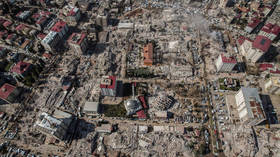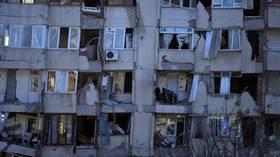Western sanctions will mean that more Syrians die after the earthquakes
 Eva Bartlett, RT, February 10, 2023 — The economic stranglehold and selective approach to aid will lead to more death and displacement.
Eva Bartlett, RT, February 10, 2023 — The economic stranglehold and selective approach to aid will lead to more death and displacement.
Following the devastating earthquakes that rocked Türkiye, Syria and their neighboring countries on February 6, leaving more than 20,000 dead, Damascus is struggling to deal with this unprecedented humanitarian catastrophe as it remains under brutal Western sanctions that have brought the country to its knees.
The West’s war on Syria that began in early 2011 failed to topple its elected president, but the subsequent years of increasingly cruel sanctions – all in the name of ‘helping the Syrian people’ – have succeeded in rendering life miserable and near impossible, with most unable to afford to properly feed their families, much less heat their homes.
Now, in a time of crisis, the Syrian people cannot even receive donations or emergency support from abroad. One supporter set up a GoFundMe campaign, only to have it taken down due to the sanctions. Type the word “Ukraine” into the search field on PayPal or GoFundMe and you’ll see countless appeals for sending money to Ukraine. But for Syrians, Western platforms like these are off-limits, and have been for years.
Adding to the destruction left by war
On February 6, southern Türkiye and northern Syria were hit by a 7.8-magnitude earthquake, followed by dozens of aftershocks and then another earthquake. While the neighboring countries of Lebanon, Jordan, Palestine, Iraq and others were affected, the worst of the damage was in Türkiye and Syria.
As of February 9, the official death toll in Syria was 1,347, with more than 2,300 injured. Nearly 300,000 Syrians have been displaced due to the earthquakes. The scenes initially coming out of Türkiye and Syria were heartbreaking and catastrophic, with buildings collapsing in front of people, and piles of rubble with the dead and the maimed trapped below.
In Syria, the earthquakes added to already extensive damage from the war. Aleppo, the country’s second-largest city, was tragically prone to building collapses because of the terrorist occupation that had lasted until 2016. The militants had frequently tunneled under buildings, in many cases in order to lay explosives and destroy them, as they did with the Chamber of Industry in April 2014. With the Syrian population already struggling to just survive prior to the earthquakes, now Aleppo and the coastal regions of Syria affected by the earthquakes face even more death, injury and displacement.
Sanctions were already killing Syrians
Even without the earthquakes, Syrians struggled to get medication, hospitals struggled to get or maintain critical machinery and equipment, and the population as a whole suffocated as the country’s economy steadily worsened, all by design.
Western leaders are adamant that the only ones to blame for the Syrians’ suffering before the earthquake were President Bashar Assad and his government (or “regime,” as Washington calls any undesirable foreign government it hasn’t yet toppled), whose “dictatorship” caused the people to rise up and start a civil war (actually a US-led proxy war against Syria to overthrow said government). The sanctions, ostensibly aimed at the “regime,” are, by this logic, intended to helpand protect the general population. In reality, they are strangling Syrian civilians.
Here’s what life is like for many Syrians now, according to British journalist Vanessa Beeley: “The US and its proxy Kurdish separatist forces are occupying Syrian resources in the northeast which includes their oil, which means of course that the bulk of Syria is reliant upon Iranian oil to keep any kind of electricity running. At the moment, we have basically about two or three hours of electricity per day. There is no heating in the majority of homes across Syria.”
As Beeley notes, earthquake-displaced Syrians – unless they receive emergency aid – face freezing and wet conditions, “without any alternative shelter, without any electricity, without any heating.” And thanks to the sanctions, desperately needed humanitarian aid and fundraising is difficult. International cargo planes can’t land in Syria, and crowdfunding services and even credit cards are unavailable. The virtue-signaling Western nations – the main cause of suffering in Syria since 2011 – have not only persisted in keeping the sanctions in place; most of them haven’t offered any meaningful help since the earthquake, just hollow words.
Thanks to criminal Western sanctions, international cargo planes can not land at Syrian airports and Syrians can not use Gofundme or credit cards. Meanwhile, the US military occupies 1/3 of the country, stealing Syria’s oil – a key source of revenue it uses to buy food and aid. pic.twitter.com/1jFXfJB2I8
— Max Blumenthal (@MaxBlumenthal) February 7, 2023
The Chinese Foreign Ministry blamed the sanctions for amplifying the miserable situation, and likewise pointed out that the US’ illegal presence in Syria and theft of Syrian resources was also exacerbating the economic situation.
“Frequent [US] military strikes and harsh economic sanctions have caused huge civilian casualties and taken away the means to subsistence of the Syrians. As we speak, the US troops continue to occupy Syria’s principal oil-producing regions. They have plundered more than 80% of Syria’s oil production and smuggled and burned Syria’s grain stock. All this has made Syria’s humanitarian crisis even worse.”
A friend in need is a neighbor on the sanctions list
All of the above has left Syrians to rely mostly on the country’s friends for help. Incidentally, many of those nations and groups are among the most vilified by the West.
The West imposes brutal sanctions against Syria, ruining every aspect of Syrians’ lives, + stealing their oil & creating the war on Syria in the 1st place.After the tragic earthquakes, who helps Syria? Those vilified by the hypocritical West: Iran, Russia, Iraq, Lebanon…
— Eva Karene Bartlett (@EvaKBartlett) February 7, 2023
Following the earthquake, Russia’s Ministry of Defense dispatched “over 300 personnel, and 60 military and special vehicles” for rescue and aid efforts in Syria. The Russian Emergencies Ministry sent more than 100 rescue workers to Türkiye and Syria, including an airmobile hospital with 40 medics.
Iran sent a plane with 45 tons of medical, food and sanitary aid to Syria, and has pledged to send more.
Even battered Libya, itself largely destroyed by another Western regime-change project, sent a plane with 40 tons of medical and humanitarian aid, as well as an ambulance, to Aleppo International Airport.
Hezbollah, the Lebanese resistance movement, sent convoys of humanitarian aid to Syria. Lebanon’s army said it would send members of its Engineering Regiment to Syria, to contribute to the search and rescue operations.
Not everyone who offered their help to Syria are on Western sanctions list, of course. Algeria sent 115 tons of aid of food and medical supplies, tents and blankets, as well as 86 specialized civil protection personnel. The United Arab Emirates will apparently send $50 million to Syria for relief efforts, and Indian, Emirati and Jordanian planes carrying humanitarian and medical aid for Syrian victims arrived in the capital on Wednesday. Even New Zealand pledged to contribute NZ$500,000 “for the Syrian Arab Red Crescent (SARC) to meet humanitarian needs.”
Meanwhile, Western corporate media stuck to the narrative of blaming the Assad government, with a New York Times article on the issue apparently saying initially that Western sanctions had hampered relief efforts to Syria – before quickly changing the line to say the government “tightly controls what aid it allows into opposition-held areas.” This is in-keeping with the old trope that the Syrian government denies aid to civilians in areas occupied by terrorists, which in most Western media are dubbed “rebels” and “opposition fighters.” This is something I and other journalists on the ground have repeatedly debunked, visiting liberated areas and hearing time and again that locals had been starving because terrorists had been hoarding humanitarian aid, denying it to civilians or selling it at massively inflated prices.
NYT never misses an opportunity to push West’s regime-change lexicon.”Opposition” = literally AL-QAEDA 🙄 Instead of calling for an end to the criminal sanctions against the Syrian people, NYT exploits humanitarian tragedy to push West’s agenda of toppling elected Syrian govt. pic.twitter.com/3RpsIiQ1VF
— Eva Karene Bartlett (@EvaKBartlett) February 8, 2023
Western aid is not for everyone
On Thursday, the World Health Organization (WHO) warned about a looming “secondary disaster” in Syria, pointing to “major disruptions” to basic life supplies, but failing to highlight the role of Western sanctions or the terrorist presence in northwestern Syria as the underlying causes. Reports on UN aid reaching northern Syria via Türkiye also downplayed the presence of Al-Qaeda terrorists in the areas mentioned, as well as Türkiye’s years-long support for Syrian anti-government forces. Such reports likewise neglected to mention the need for emergency relief in government-controlled areas of Syria, and the government’s efforts to bring that relief in.
Some 12 years into the West’s proxy war on Syria, the continued denial of the very basics of emergency humanitarian relief to Syrians outside “rebel-controlled” areas, shows how little the West’s claim to care for Syrians really matter. The lack of concern by the UN, WHO, and affiliated aid agencies for the Syrians of Aleppo, among other government-controlled areas, is not at all surprising, given these bodies over the years systematically downplayed terrorism against Syrian civilians.
As the humanitarian disaster continues, it is also worth remembering that, over the decades, Syria has taken in refugees from numerous countries. Yet, in spite of the current emergency situation and the very dire need to lift the West’s sanctions, it is unlikely the “benevolent” West will change its crippling anti-Syria policies to allow Syrians to merely survive.
*
Eva Bartlett is a Canadian independent journalist. She has spent years on the ground covering conflict zones in the Middle East, especially in Syria and Palestine (where she lived for nearly four years). The writer is a recipient of the 2017 International Journalism Award for International Reporting, granted by the Mexican Journalists’ Press Club (founded in 1951), was the first recipient of the Serena Shim Award for Uncompromised Integrity in Journalism, and was short-listed in 2017 for the Martha Gellhorn Prize for Journalism.


